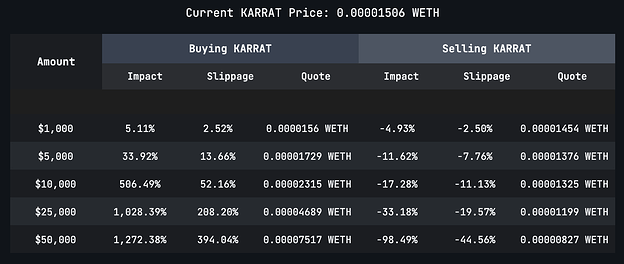Proposal Name
Increased KARRAT DEX Liquidity Strategy Using Arrakis Pro Vault
KIP Type
Non-Constitutional KIP
Abstract
This KIP proposes a $500,000 KARRAT/ETH liquidity vault on Uniswap v4 using Arrakis Pro, funded by a discounted KARRAT sale at $0.025 per KARRAT, targeting $100,000 in USDC, which is converted to ETH for the vault. Managed by the MPH SubDAO Working Group multisig with a 1-month lockup after the vault launch, vesting 25% monthly over 4 months, distributed by MPH SubDAO multisig, it ensures stable liquidity and treasury diversification. The sale ends when $100,000 USDC is raised, with excess funds returned if oversold. If the USDC target is unmet, the vault proceeds with funds raised.
Motivation
Price Impact Analysis for the KARRAT/ETH Liquidity pool (Dated 14.07.2025) on Uniswap V3 illustrates that swaps of $1k and more are not feasible with the current on-chain liquidity profile
KARRAT DAO’s limited onchain liquidity restricts trading capacity and deters larger participants. Traditional liquidity mining creates temporary “rented” liquidity and sell pressure. This proposal establishes Protocol-Owned Liquidity (POL) using Arrakis Pro for stable, long-term liquidity and treasury resilience, aligning with KARRAT’s community-owned ecosystem goals.
Rationale
Price impact determines the magnitude of movement in the KARRAT/ETH pool price after the swap (data from 14.07.25)
This KIP prioritizes DAO-owned liquidity, eliminating emissions and sell pressure. Arrakis Pro’s non-custodial, algorithmically managed strategy on Uniswap v4 offers upto 10x capital efficiency, minimal slippage, and impermanent loss protection via audited contracts. Real-time analytics and MPH SubDAO governance ensure transparency, while ETH pairing diversifies the treasury for future DeFi strategies.
Key Terms
- POL: Protocol-Owned Liquidity managed by the DAO.
- Arrakis Pro Vault: Hybrid active liquidity strategy, DAO-controlled.
- Multisig: Multi-signature wallet governed by MPH SubDAO Working Group.
Specifications
- Total vault size: $500,000 USD
- Composition: 80% KARRAT ($400,000 USD, treasury), 20% ETH ($100,000 USD target, converted from USDC raised via discounted sale)
- Platform: Uniswap v4 with Arrakis Pro Private Vault
- Vault control: MPH SubDAO Working Group multisig
- USDC source: Community discounted KARRAT sale at $0.025/KARRAT, converted to ETH for vault deposit
- Vault ownership: Fully DAO-owned, non-custodial
- Continuation: If $100,000 USD USDC target is unmet, vault proceeds with funds raised, converted to ETH, adjusting KARRAT contribution to maintain 80/20 structure.
Arrakis Pro Overview
Arrakis Pro, a leading non-custodial liquidity platform, builds sustainable POL on Uniswap v4 for DAOs like MakerDAO, Lido, and Kwenta, handling over $2 billion in trading volume as of 2025. Its hybrid architecture ensures efficiency for KARRAT DAO’s $500,000 vault.
Key Advantages:
-
Security: Audited contracts by Trail of Bits and OpenZeppelin, funds in MPH SubDAO multisig.
-
Uniswap v4 Efficiency: Single pool design saves ~30% on gas; real-time tools reduce price swings.
-
Capital Efficiency: Upto 10x better, e.g., Gelato (66% volume with 25% TVL).
-
No Emissions: Organic trading avoids sell pressure.
-
Governance: Real-time dashboard and multisig updates for transparency.
-
Revenue: Retains 50% of trading fees (at 1% tier).
-
Scalability: Deployed on multiple EVM chains including Base, Arbitrum, BNB, Polygon, Unichain, Optimism, etc. with support for multiple DEX frameworks like Uniswap, Aerodrome, Pancakeswap and Velodrome.
-
Future-Proof: Fully compatible with custom Uniswap v4 hooks.
Learn more: https://www.arrakis.finance/
Historical Performance Examples with Arrakis Pro
-
Kwenta (KWENTA/WETH): Started with 5% ETH, grew to ~67%. Read more: https://mirror.xyz/0x929fCf268A62e684221f1e39B8b6ddA2f0dA4AeC/GzkTmH8MRlcw7QkgdHZh5M9jIyfGbnfgkzGJfkSo_io
-
Gelato (GEL/WETH): Started at 8% ETH, reached 42–55%, facilitated 66% volume with 25% TVL. Read more: https://mirror.xyz/0x929fCf268A62e684221f1e39B8b6ddA2f0dA4AeC/GzkTmH8MRlcw7QkgdHZh5M9jIyfGbnfgkzGJfkSo_io
-
Perpetual Protocol (PERP/WETH): Outperformed hold by ~1%, supported 36% volume with 2.9% TVL. Read more: https://mirror.xyz/0x929fCf268A62e684221f1e39B8b6ddA2f0dA4AeC/GzkTmH8MRlcw7QkgdHZh5M9jIyfGbnfgkzGJfkSo_io
-
Parallel DAO (MIMO/WETH): Achieved 50/50 balance without incentives, reducing slippage. Read more: https://mirror.xyz/blog.mimo.eth/NPYvu5Dg01LcHlEjLaKLnShTtaX6Gp2esWb5keCsgJQ?utm
Steps to Implement
-
Announce discounted KARRAT sale: Collect up to $100,000 USDC, with a 2-week minimum duration, extendable by the MPH SubDAO Working Group based on market conditions, with extensions announced on Discourse. Participants buy KARRAT at $0.025, supporting DAO liquidity. The sale ends when $100,000 USDC is raised, even if before the 2-week minimum. If oversold, excess funds will be returned.
-
Fund vault: Deposit 80% KARRAT ($400,000 USD) from treasury. Convert USDC to ETH and deposit 20% ETH (up to $100,000 USD) from sale.
-
Activate Arrakis Pro strategy: Start automated, range-based liquidity management.
-
Lock purchased KARRAT in DAO multisig for 1 month after vault launch, vesting 25% monthly over 4 months, distributed by MPH SubDAO multisig.
Timeline
Timelines may shift due to technical setup or governance processes, with updates shared on Discourse.
Fees
-
Annual Management Fee: 1% of assets under management (AUM), charged by Arrakis Pro for managing the vault.
-
Trading Fees: 50% of trading fees generated by the vault are retained by Arrakis Pro
Overall Cost
Total cost to the DAO treasury: $500,300 USD, paid in KARRAT.
Breakdown:
-
KARRAT allocated to vault: $400,000 USD (for the 80% KARRAT portion of the liquidity vault).
-
KARRAT allocated for community sale: 4,000,000 KARRAT (used to raise $100,000 in USDC, converted to ETH for the vault’s ETH portion).
-
Operational and transaction costs: $300 USD of KARRAT converted for GAS.
Note:
- If the USDC raise does not reach $100,000, the vault structure will be adjusted using available treasury reserves or partial sale proceeds, converted to ETH. If the sale is oversold, excess funds will be returned to participants.
-If the community sale falls outside the legal framework provided, an alternative plan will be brought forward to market sell.


